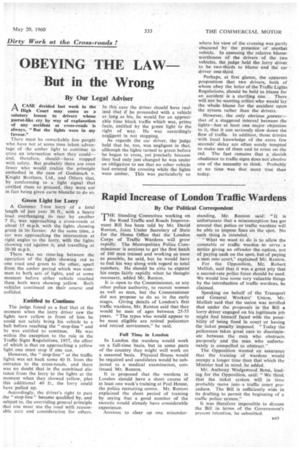Dirty Work at the Gross-roads!
Page 77

If you've noticed an error in this article please click here to report it so we can fix it.
OBEYING THE LAW But in the Wrong
By Our Legal Adviser
A CASE decided last week in the in. High Court may come as a salutary lesson to drivers whose parrot-like cry by way of explanation of any accident at cross-roads is always, "But the lights were in my favour."
There must be remarkably few people who have not at some time taken advantage of the amber light to continue to cross an intersection when they could— Lind. therefore, should—have stopped with safety. But probably there are even fewer who would realize the principle embodied in the case of Godsmark v. Knight Brothers, Ltd., and Others that, by conforming to a light signal that entitled them to proceed, they were not in fact being given carte blanche to do so.
Green Light for Lorry
A Commer 7-ton lorry of a total length of just over 30 ft., with a heavy load overhanging its rear by another 7 ft., was approaching a cross-roads at about 15 m.p.h. with the lights showing green in its favour. At the same time, a car was approaching the intersection at right angles to the lorry, with the lights showing red against it, and travelling at 20-30 m.p.h.
There was no time-lag between the operation of the lights showing red to one road and green to the other, apart from the amber period which was common to both sets of lights, and at some moment before either vehicle reached them both were showing yellow. Both vehicles continued on their course and
Entitled to Continue The judge found as a fact that at the moment when the lorry driver saw the lights turn yellow in front of him he could not safely bring his vehicle to a halt before reaching the " stop-line " and
he was entitled to continue. He was within the exception to the rule in the Traffic Signs Regulations, 1957, the effect of which is that on approaching a yellow light one must stop if one can.
However, the " stop-line " at the traffic lights was set back some 40 ft. from the entrance to the cross-roads, and there was no doubt that in the combined distance from the lorry to the lights at the moment when they showed yellow, plus this additional 40 ft., the lorry could have pulled up.
Accordingly, the driver's right to pass the " stop-line " became qualified by, and subject to, the overriding general principle that one must use the road with reasonable care and consideration for others. In this case the driver should have realized that if he proceeded with a vehicle as long as his, he would for an appreciable time block traffic which was, prima facie, entitled by the green light to the right of way. He was accordingly negligent in not stopping.
As regards the car driver, the judge held that he, too, was negligent in that, although the lights turned to green before he began to cross, yet precisely because they had only just changed he was under an obligation to see that no other vehicle had entered the crossing while the lights were amber. This was particularly so where his view of the crossing was partly obscured by the presence • of another vehicle. In assessing the relative blameworthiness of the drivers of the two vehicles, the judge held the lorry driver to be two-thirds to blame and the car driver one-third.
Perhaps, at first glance, the apparent proposition that two drivers, both of whom obey the letter of the Traffic Lights Regulations, should be held to blame for an accident is a startling one. There will not be wanting critics who would lay the whole blame for the accident upon the system rather than the drivers.
However, the only obvious ,a,nswerthat of a staggered interval between the lights—has at least one major objection to it, that it can seriously slow down the flow of traffic. In addition, those drivers with local knowledge of the extra few seconds' delay are often sorely tempted to make use of them and to cross on the red. The fact remains that a .slavish obedience to traffic signs does not absolve one of the necessity to think. Probably at no time was that more true. than today.




















































































































